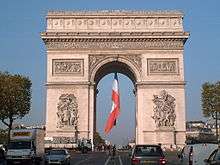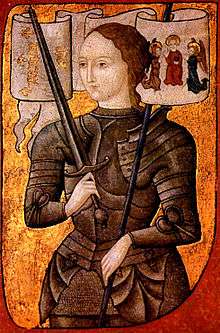French nationalism


French nationalism is the nationalism that asserts that the French people are a nation and promotes the cultural unity of the French.[1]
History
French nationalism emerged from its numerous wars with England, which involved the reconquest of the territories that made up France. The wars produced a a great icon of French nationalism, Joan of Arc. The Catholic religion also played a major role after the Protestant Reformation.[2] French nationalism became a powerful a movement after the French Revolution in 1789. Napoleon Bonaparte promoted French nationalism based upon the ideals of the French Revolution such as the idea of "liberty, equality, fraternity" and justified French expansionism and French military campaigns on the claim that France had the right to spread the enlightened ideals of the French Revolution across Europe, and also to expand France into its so-called "natural borders." Napoleon's invasions of other nations had the effect of spreading the concept of nationalism outside France.[3]
1814-1914
After Napoleon's defeat and downfall, French nationalism from the 19th to early 20th century took on an assertive and extreme patriotism that supported military force to achieve its political goals.[3] During World War I France pursued irredentist claims on the region of Alsace-Lorraine that had been lost to Germany at the end of the Franco-Prussian War of 1870-1871. French national pride was damaged in World War I by the long, drawn out war with Germany fought on its soil; especially in World War II when the French government surrendered to Germany in 1940; and after France lost many of its colonies due to decolonization after World War II.[3]
The symbols of nationalism included not only Joan of Arc, but also Roland, the hero of The Song of Roland (La chanson de Roland). He died in combat against the Unfaithful while defending Charlemagne and his men, making him a suitable patriotic symbol for the modern age.[4]
The politics of left and right played a role as conservatives seized on nationalism to attack the left. Conservative French nationalists successfully labeled antimilitarism as antinationalist in the 1898-1914 era. Many of the more vocal antimilitarists were activists anarchist and radical Marxist organizations. Historians have interpreted this attack by arguing French nationalism was rejecting its roots in the French Revolution and was becoming something of an extremist, protofascist movement. However most antimilitarists did not reject their nation, but instead claimed to to be protecting the Republic, which they saw as synonymous with the nation. They saw the conservatives as a danger to a republican France.[5]
The large conservative Catholic element, frustrated by the failure to restore the monarchy, turned to a new variation on nationalism. Led by the daily newspaper La Croix, founded by the Assumptionist priests in 1883, it denounced the Republic's anti-clericalism, and encouraged Boulangism and Germanophobia. It promoted French imperialism as the fulfillment of a mission to bring civlization and Christianity to the pagans ("mission civilisatrice") and it boasted of France's cultural superiority over everyone else.[6]
The Dreyfus affair of the 1890s saw conservatives use nationalism to attack the Third Republic. However when the republicans passed laws hostile to the Catholic Church in 1901-1905, such as disbanding the Assumptionists, many conservatives switched their energies and funding away from nationalistic projects to instead a defense of the Church. Devout Catholic women were especially active in this switch. Historian Robert Fuller argues it effectively ended the nationalist challenge to the Third Republic.[7]
Since 1914
The war hero of Free France, Charles de Gaulle became President of France and sought to resurrect national pride. De Gaulle sought to make France the leader of an independent Europe - free from American and Soviet influence.[8] De Gaulle's government sought Franco-German reconciliation and took a leading role in the founding of the European Coal and Steel Community that sought to resolve economic tensions between France and Germany, that French foreign minister Robert Schuman declared was designed "to end Franco-German hostility once and for all.".[8]
In recent years the growing role of Muslims in French life has reopened issues of gender. A flashpoint of controversy is the legal treatment of veiled Muslim women and prostitutes. The government has targeted the under-covered bodies of prostitutes and the over-covered bodies of veiled Muslim women in order to exclude them from the public space. The emerging forms of French nationalism emphasizes the promotion of sexual liberalism as a core value of citizenship. Julie Billaud and Julie Castro argue that the goals are to enforce a virile nationalism, prescribe new sexual norms, and criminalize immigrants and those living at the social margins.[9]
See also
References
- ↑ Motyl 2001, pp. 170.
- ↑ David A. Bell, The Cult of the Nation in France: Inventing Nationalism, 1680-1800 (2001).
- 1 2 3 Motyl 2001, pp. 171.
- ↑ Isabel N. DiVanna, "Politicizing national literature: the scholarly debate around La chanson de Roland in the nineteenth century." Historical Research 84.223 (2011): 109-134.
- ↑ Elizabeth Propes, "Re-thinking Antimilitarism: France 1898–1914." Historical Reflections 37.1 (2011): 45-59.
- ↑ William F. Ryan, . La Croix and the rise of French rightist nationalism in the 1880s," Canadian Review of Studies in Nationalism (1974) 1#2 pp 159-172
- ↑ Robert L. Fuller, "Catholic Women and the Unmaking of French Nationalism After the Dreyfus Affair." European History Quarterly 37.2 (2007): 242-264.
- 1 2 Motyl 2001, pp. 172.
- ↑ Julie Billaud and Julie Castro, "Whores and Niqabées: The Sexual Boundaries of French Nationalism," French Politics, Culture & Society (2013) 31#2 pp 81-101
Bibliography
- Bell, David A. "Lingua Populi, Lingua Dei: Language, Religion, and the Origins of French Revolutionary Nationalism." American Historical Review 100#5 (1995), pp. 1403–1437. in JSTOR.
- Bell, David A. The Cult of the Nation in France: Inventing Nationalism, 1680-1800 (2001) emphasizes religion and the wars with England.
- Ben-Amos, Avner. “Monuments and Memory in French Nationalism.” History and Memory 5#2 (1993), pp. 50–81. in JSTOR
- Hyslop, Beatrice Fry. French Nationalism in 1789 According to the General Cahiers (1934)
- Motyl, Alexander J. (2001). Encyclopedia of Nationalism, Volume II. Academic Press. ISBN 0-12-227230-7.
- Sternhell, Zeev. “Paul Deroulede and the Origins of Modern French Nationalism.” Journal of Contemporary History 6#4 (1971), pp. 46–70. in JSTOR.
- Vincent, K. Steven. “National Consciousness, Nationalism and Exclusion: Reflections on the French Case.” Historical Reflections / Réflexions Historiques 19#3 (1993), pp. 433–449. in JSTOR
